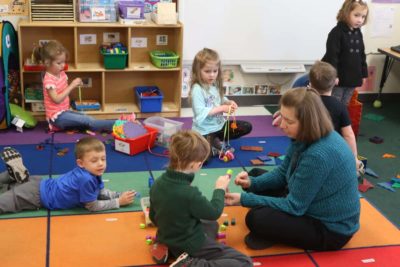

A new three-year, $40 million federal grant will support improvements to North Carolina’s early education system (birth through five). The Preschool Development Grant (PDG) activities align with the Pathways to Grade-Level Reading Action Framework and the NC Early Childhood Action Plan.
So what’s in it? Here’s a breakdown of what the Division of Child Development and Early Education (DCDEE) is planning to do over the next three years to build a stronger, more aligned early education system and improve outcomes for young children and their families.
We share a brief overview of each activity, along with the direct link to the specific page number where that activity appears in the proposal, so you can dip in wherever you are the most interested. Or you can download the full PDG application here.
We plan to keep you updated over the course of the next few years on progress made.
Activity 1: Update a needs assessment
A smaller federal grant in 2019 enabled NC to conduct a broad-ranging needs assessment that included:
- Reviewing and synthesizing existing data and nearly 70 recent reports addressing needs of and services for NC families with children birth to age five
- Conducting 12 listening sessions with families representing key target populations living in both urban and rural counties
- Conducting one-on-one interviews with parents to ensure full representation
- Surveying early educators statewide to gather information about services and barriers
Listening sessions and interviews intentionally included families of children who live in a household with an income at or below 75% of the state median income, have had multiple adverse childhood experiences, are experiencing homelessness, have an identified developmental disability or chronic health condition, have limited English proficiency, live in rural areas, and/or are part of a tribal population. The early educator survey also included focus questions on these populations of families and children.
The needs assessment found strengths and areas of opportunity and will be updated twice over the next three years. Read more about the needs assessment here (pages 5-10).
Activity 2: Update a Birth-to-5 Strategic Plan
In the fall, NC submitted to the feds a draft version of a Birth-to-Five (B-5) Strategic Plan, outlining what DCDEE will do to improve the state’s early education system over the next few years. NCECF then managed the collection of Input on that draft strategic plan over the late fall and early winter from early childhood professionals and families. That input has been integrated into the strategic plan, and that plan will guide DCDEE’s work for the next three years.
The B-5 strategic plan is built around four goals that align with the needs assessment, the Early Childhood Action Plan, and the Pathways to Grade-level Reading initiative, including:
- High-Quality Early Learning
- On Track for School Success
- Supported and Supportive Families
- Social-Emotional Health and Resilience.
To accomplish these four goals, the plan lays out strategies, including outlining past work in each area, aligning relevant information from the needs assessment, identifying additional partners who will contribute, and detailing a timeline to move forward on each goal. The plan also includes measurable sub-targets designed to ensure the strategies produce desired outcomes. Read more about the strategic plan here (pages 10-14).
Activity 3: Maximize parent and family knowledge, choice, and engagement in their children’s early learning and development, through:
- Expanding universal home visiting pilot, Family Connects, with plans for a statewide scale-up (see p. 15-16)
- Training on a Family Engagement and Leadership Framework. A State Family Engagement and Leadership Coalition was formed in 2019 that created a family engagement framework that establishes common definitions and expectations for how early childhood service providers deliver services to and partner with families and other stakeholders. During this grant period, NC will develop and implement training and a train-the-trainer model to support state and local cross-sector service providers in applying the new Framework. (see p. 17-18)
- Increasing local capacity to improve and promote family engagement across systems. In 2019, ten local county coalitions were established with 20-40 percent family representation and cross-sector early childhood service providers to help develop the Framework described above. An additional 10 local partnerships will be brought on each year of the new grant, for a total of 40 local partnerships participating by the end. They will inform the refinement of the Framework, receive training on the framework, individualized technical assistance, and cohort discussions, and create action plans. (see p. 18-19)
- Expanding and improving family outreach materials and activities to improve family knowledge about available services. UNC-TV Public Media NC will work with local communities to host events aimed at deepening engagement with families, specifically those that are under-served, including tribal families, families with English as a second language, and families with children with special needs. (see p. 19-20)
Activity 4: Professional development for the early childhood workforce and sharing best practices, through:
- Providing job-embedded Practice Based Coaching to advance the knowledge and skills of educators, including trauma-informed care and social-emotional resilience. There will be a focus on infant-toddler teachers. (see p. 22-23)
- Incorporating best practices in a standardized process of transition from preschool into kindergarten with a focus on professional development. Thirty-three counties will be added to the current PreK-K Transitions pilot of 17 counties. A shared data platform will allow NC PreK teachers to more easily access children’s data and transfer it to elementary schools. (see p. 23-26)
- Professional development for early educator workforce for early identification of young children in need of social-emotional health services. Professional development will be provided to 750 early educators on identifying indicators for developmental delays, mental health risks, and how to make a referral, and to 60 mental health workers on early childhood mental health evidence-based practices and diagnostic classification. (see p. 26)
Activity 5: Improving overall quality of programs and service integration, expanding access to and developing new programs, including:
- Babies First NC infant/toddler quality improvement pilot. The project is being implemented in center-based, 5-star early education and care settings in areas of the state that exhibit the greatest need for high quality infant/toddler care, not currently served by Early Head Start. (See p. 28-29) The new model includes:
- Financial support to help families pay for the cost of high-quality care, which allows for higher teacher salaries and lower ratios
- Enhancement payments for each classroom based upon teacher qualifications
- Start-up funds for new sites
- Stipend per child for transportation
- Intensive coaching and professional development
- Data tracking
- Conducting a feasibility and cost study of establishing a statewide high quality infant/toddler program based on the Babies First NC pilot (see p. 29-30)
- Increasing early identification and mental health supports for young children (see p. 30-33), including:
- Speech/language pathology teletherapy pilot in rural western NC
- Enhance family engagement in the NC Early Intervention program for the preschool transition
- Engage families to support Local Interagency Coordinating Councils (LICCs)
- Increasing access to high-quality early education for children experiencing homelessness by creating a state strategic plan to increase access and disseminate and provide training on an assessment and quality improvement tool designed to provide emergency shelters across NC with resources needed to help families with young children. (see p. 33-35)
- Expanding work to develop universal application and enrollment process, to better coordinate service delivery and to increase families’ access to early childhood programs and resources. (see p. 35-36)
- Increasing access to high-quality early education through building an alternative child care subsidy market rate model. (see p. 36-37)
Activity 6: Monitoring, evaluation, data use for continuous improvement, meaningful governance, and stakeholder engagement, through:
- Enhancing and expanding the NC Early Childhood Integrated Data System (ECIDS) to include data from Head Start, home visiting, and K-3 public education. (see p. 38-42)
- Expanding NCCARE360 to every county. NCCARE360 is a shared technology platform that allows providers to electronically connect those with identified needs to community resources, creates a “no wrong door” approach, closes the loop on every referral made, reports on the outcomes of each connection, and allows for screening of unmet needs. (see p. 42-43)
- Creating a data platform to support transitions from preschool to kindergarten through Teaching Strategies GOLD®, a system for assessing children’s knowledge, skills and behaviors from birth through third grade. Data will be shared across Pre-K and kindergarten programs and teachers will receive professional development on using the system. (see p. 44-45)
- Supporting data-informed local strategic planning, through providing technical assistance to local cross-sector Human Services leadership teams to train communities about best practices for using and interpreting quality data, as well as to support 30 communities to develop strategic plans based on data. (see p. 45)
- Convening an NC Early Childhood Data Advisory Council to provide state-level strategic direction to improve the quality and scope of early childhood data collection and support analysis and use of early childhood data by policymakers and other decision-makers. The Data Advisory Council is facilitated by NCECF, in partnership with the NC Department of Health and Human Services (NCDHHS). (see p. 45-46)
Other sections of the report
The rest of the report includes sections on how progress will be monitored and evaluated (p. 46-53) and a process timeline by quarters for 2020 tasks (p. 57-60). The logic model on page 63 is useful for understanding DCDEE’s vision of how the activities of the grant will support better outcomes for young children and their families. The budget begins on page 66.
Preschool Development Grant background
NC was one of 46 states awarded a one-year Preschool Development Grant from the Administration for Children and Families, Office of Child Care in 2019 for activities to strengthen the state’s early childhood education system. At the end of 2019, NC was one of 20 states that received three-year PDG continuation grants.
The NC Division of Child Development and Early Education at the Department of Health and Human Services is the grant administrator and will receive over $40 million during the 3-year grant to build upon the work from the previous planning grant and implement activities that will address areas identified as high priority in the PDG Needs Assessment and Strategic Plan.
Editor’s note: This perspective was first published by the NC Early Childhood Foundation. It has been posted with the author’s permission.




